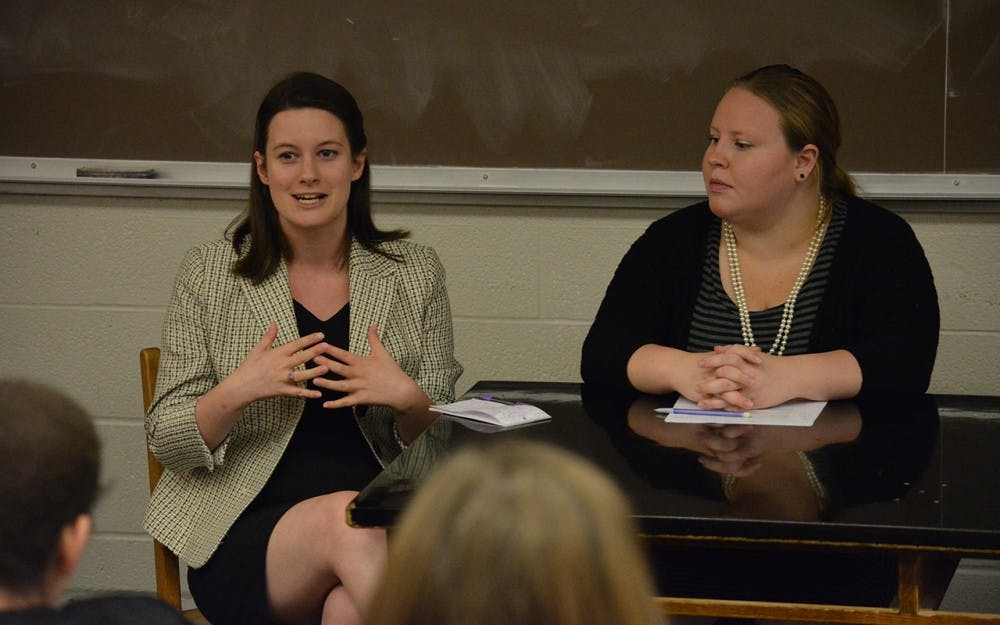In an effort to highlight the importance of political responsibility across the board, the Political Science Club and Students for Equity in Public Affairs brought together four panelists to discuss minority representation Wednesday night. Topics for the panel included police, immigration and abortion issues.
“We’re really excited that these issues are able to be discussed in a bipartisan way,” said Rebekah Molasky, senior and president of the Political Science Club.
Molasky and senior Maya Fews of SEPA collaborated to bring the event together. The panelists included School of Public and Environmental Affairs professor Sean Nicholson-Crotty, SEPA member Miguel Palabrica, College Democrats at IU’s Paige Settles and College Republicans at IU’s Nicole Keesling.
For a time, Molasky and Fews feared they might not see as much diversity of opinion as they had originally planned.
The Democrats and Republicans cancelled a three-on-three debate last week over an organizational dispute and had not worked together since. Molasky and Fews said they thought the argument might cause one or both of the organizations to bow out.
In the end, Keesling and Settles were both able to represent their respective parties at the panel. Both women said they were happy to be working with one another once again.
“Part of civility is getting past disagreements,” Keesling said.
It opened with discussion of stop-and-frisk, a controversial practice in which police officers stop suspicious individuals to question them and then search them for weapons.
Nicholson-Crotty said law enforcement needs to stop this policy because it was ruled unconstitutional due to disproportionate use on minorities.
The effects of stop-and-frisk on a minority member’s psyche can be very different than what a white person experiences, Palabrica said. He attributed this to the possibility that minorities feel their race plays a role in the questioning.
Palabrica also talked about his experience growing up in Chicago and the violence he saw there. He said at night he would either see white people being mugged or cops in his neighborhood targeting and torturing gang members.
“The tendency is towards mutual distrust,” Palabrica said.
Settles said a solution to the problem could lie in community policing. She cited an apartment complex in Florida where police involvement in the community brought down crime rates by 32 percent.
Although the situation in Chicago might benefit from community policing, its inability to fix the underlying problems of poverty is prohibiting it from lowering crime rates, Keesling said.
The panel also discussed immigration. Keesling took a strong position in support of the wall Donald Trump proposed be built along the Mexican-American border. In addition to the wall itself, there would be additional patrol security, which is where she said the real border security would arise and limit illegal access to the country.
“We have responsibility as Americans to help people come here through the right process,” Keesling said.
Palabrica disagreed. People would be smuggled in by cars just as they were before, not by climbing a wall, he said.
Nicholson-Crotty said he saw the issue as part of the Republican party’s recent inability to recognize how nuanced the Latino vote was. This religious, entrepreneurial group should be have a strong showing for Republicans, but policies like the wall turn them toward the Democrats, he said.
Settles said he has noticed Trump is much more conservative than many of Republicans in Congress, and Trump’s conservatism keeps the Latinos away.
After the group finished discussing the wall, Settles opened the discussion on abortion, which was the last topic of the night, and talked about the Hyde Amendment.
This amendment restricts federal funding for abortions unless the procedure is used to save the mother’s life or if the pregnancy was caused by rape or incest.
Settles said the amendment should be repealed entirely, although other members of the panel disagreed.
As a pro-life believer, Keesling said the government should stay out of it entirely. She did acknowledge the practice is legal, but thought it should be kept privatized.
For Nicholson-Crotty, the issue is so closely tied to religious beliefs that the government’s involvement in the process hurts them. He said religious citizens should not have to use their tax dollars to pay for what they believe is murder.
Palabrica said he did see where the funding could be useful, however. He thought it would help minority women gain access to a service which is much more affordable to whites and the middle class. This would improve equality, which he said the government is responsible for.
“We don’t live in a world where reproductive health is equally distributed between blacks, whites and Latinos, and under- and middle-class people,” Palabrica said.




